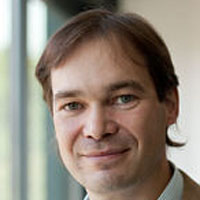Titre : Green Chemistry Through Biocatalysis: From Process Development Towards Integration in Chemoenzymatic One-Pot Processes.
La conférence sera prononcée en anglais par le professeur Harald Gröger du Département de chimie de l'Université de Bielefeld (Allemagne). Elle est commanditée par le Centre en chimie verte et catalyse (CCVC)
Résumé : The research activities of the Gröger group center around the application of enzymes as valuable and environmental friendly catalysts in organic synthetic transformations. A particular goal of the highly interdisciplinary research projects is the development of organic synthetic processes which fulfil the criteria of high efficiency, sustainability and scalability. To realize such processes we focus on (1) the development of efficient biocatalytic reactions and technical applications thereof, (2) the combination of biocatalysis with chemocatalysis in one-pot multi-step syntheses in water, and (3) target driven synthesis based on the use of biocatalysts in synthetic key steps for the production of fine chemicals and pharmaceuticals.
In the research area of bioprocess development Gröger and his teams (in industry until 2006, at the University of Erlangen-Nürnberg from 2006 to 2011 and at Bielefeld University since 2011) developed successfully many new biocatalytic processes applying, e.g., innovative biocatalyst concepts. Within these interdisciplinary projects jointly with collaboration partners several processes running on industrial scale have been realized. A particular highlight is the developed highly efficient asymmetric biocatalytic reduction and reductive amination technology based on the use of recombinant whole cell catalysts. Both types of processes run at high substrate loading of typically >100 g/L and give the desired products with >99% ee. Recently, jointly with collaboration partners new biocatalytic processes have been developed using enoate reductases (for C= C-reduction) and L-threonine aldolases (for aldol reactions). Furthermore various chemoenzymatic one-pot multi-step processes in water have been developed by combining “classic” chemical reactions, metal-catalyzed reactions and organocatalytic reactions, respectively, with enzymatic transformations, leading to an efficient formation of the desired products with excellent enantioselectivity. These research achievements underline that such combinations of the two “worlds of catalysis”, chemocatalysis and biocatalysis, are possible, enabling advantageous synthetic processes, which avoid solvent-intensive and waste-generating process steps. Furthermore, we could successfully apply biocatalysts in the enantioselective (multi-step) synthesis of pharmaceutically relevant molecules. By means of different types of biotransformations as key steps, novel synthetic approaches towards, e.g., non-natural -amino acids, -amino acid derivatives and specific chiral alcohols have been realized.
Publications sélectionnées :
- Angew. Chem. Int. Ed. 2006, 45, 1645-1648.
- Angew. Chem. Int. Ed. 2006, 45, 5677-5681.
- Angew. Chem. Int. Ed. 2008, 47, 9551-9554.
- Angew. Chem. Int. Ed. 2009, 48, 9355-9358.
- Angew. Chem. Int. Ed. 2011, 50, 2397-2400.
- Angew. Chem. Int. Ed. 2011, 50, 7944-7947.
- Angew. Chem. Int. Ed. 2013, 52, 2359-2363.
- Angew. Chem. Int. Ed. 2013, 52, 9323-9326.
